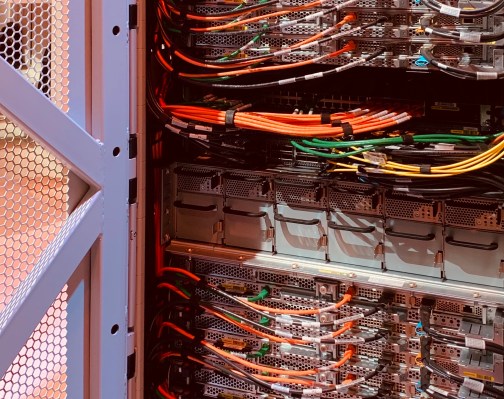
When AWS announced Outposts last year, a private cloud hardware stack they install in your data center, there were a lot of unanswered questions. This week at AWS re:Invent in Las Vegas, the company announced general availability as the vision for this approach began to become clearer.
AWS CEO Andy Jassy, speaking at a press conference earlier today, said there are certain workloads like running a factory that need compute resources to be close because of low-latency requirements. That’s where Outposts could play well, and where similar existing solutions in his opinion fell short because there wasn’t a smooth connection between the on-prem hardware and the cloud.
“We tried to rethink this with a different approach,” he said. “We thought about it more as trying to distribute AWS on premises. With Outposts, you have racks of AWS servers that have compute, storage, database and analytics and machine learning on them. You get to decide what composition you want and we deliver that to you,” he said.
The hardware is equipped with a slew of services, including Amazon Elastic Compute Cloud (EC2), Amazon Elastic Block Store (EBS), Amazon Virtual Private Cloud, Amazon ECS, Amazon Elastic Kubernetes Service and Amazon EMR. Conspicuously missing is S3 storage, but Amazon promises that will be coming in 2020 with other services on deck, as well.
Make no mistake, the world’s premiere cloud infrastructure vendor will be installing a rack of hardware inside your data center. AWS has formed a team inside the company to handle installation, monitoring and management of the equipment.
The easy way to think about this would be that it’s a way for companies that might be afraid to go all-in on the cloud to start experimenting with a cloud-like environment, which you can manage from an AWS console or VMware (beginning next year). Yet an Amazon spokesperson indicated that many companies like Morningstar and Philips Healthcare, both of which are already AWS public cloud customers, are choosing Outposts because it gives these customers ultra-low latency, almost like a hyper-local availability zone.
These customers need to keep compute resources as close as possible to run a particular set of jobs. While a local availability zone like the one announced for Los Angeles yesterday could also suffice for this, Outposts could help when there isn’t a local option.
Customers can sign up for Outposts in a similar fashion to any EC2 instance, but instead of spinning it up in the cloud, an order goes to the Outposts team, and it gets racked, stacked and installed on prem.
From then on, Amazon still handles the management just as it does with a public cloud instance. For now, installation and management is being handled by an internal Amazon team, but over time they plan to work with systems integrators to help handle some of that workload.




